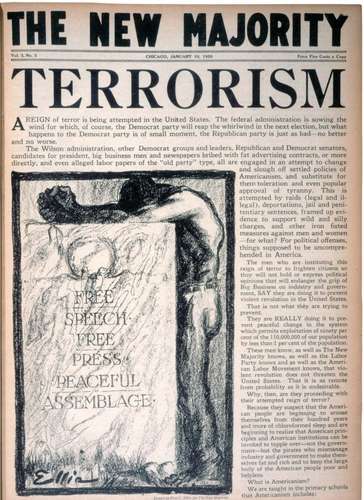
Word of the Day: Saturnine
Today’s word of the day, thanks to https://www.synonyms.com/wotd.php, is saturnine. It’s an adjective that means “sluggish in temperament; gloomy; taciturn,” “suffering from lead poisoning, as a person,” or “due to absorption of lead, as bodily disorders” (https://www.dictionary.com/browse/saturnine?s=t). According to www.etymonline.com, it entered the language sometime in the 14th and means “literally “born under the influence of the planet Saturn,” from Middle English Saturne (see Saturn) + -ine (1). Old medicine believed these characteristics to be caused by the astrological influence of the planet Saturn, which was the most remote from the Sun (in the limited knowledge of the times) and thus coldest and slowest in its revolution.”
This morning 100 years ago, Americans woke up to learn about a series of raids that took place around the country called the Palmer Raids.
Some background. Although the USA did not officially enter World War I until 1917, and although Woodrow Wilson campaigned in 1916 on the slogan, “He kept us out of war,” Wilson did have us involved in the war on the side of the British and the French. We were shipping armaments to the Brits using passenger liners (which was how people went to Europe in the 19 teens). In 1915, Wilson warned the country about “hyphenated Americans,” immigrants who might have a stronger loyalty to their country of origin than to the States.
America finally entered the war in 1917, and within a month, by executive order, Wilson created the Committee for Public Information, a disinformation agency that was designed to build support for the government’s having involved the country in a European war. “A national venture in thought control, it bludgeoned the people with Wilson’s view until it became their view, as well. It was government propaganda on a scale never before seen in the US, flooding the country with CPI-approved war news, speakers, school materials, posters, buttons, stickers—the works” (https://fee.org/articles/the-palmer-raids-america-s-forgotten-reign-of-terror/).
Then Congress passed the Espionage Act, which made it illegal, with very stiff penalties, to say anything against the government’s war effort. “It was amended in May 1918 by the Sedition Act, which made it a crime to write or speak anything “disloyal or abusive” about the government, the Constitution, the flag, or a US military uniform” (ibid.). Wilson’s Attorney General, Thomas Gregory, encouraged Americans to report bad behavior on the part of neighbors, friends, and others, and report it to the Justice Department. Within a few months, the Justice Department was fielding 1500 reports a day.
The Post Office began to censor mail, refusing to deliver any media that was at all critical of the government or the war effort. People were arrested and tried for criticizing Wilson or the war. Eugene Degs, socialist and presidential candidate, was arrested for seditious speech and sentenced to 10 years in prison.
The war against the Hun ended in 1918, but 1919 and 20 saw the beginning of the nation’s first “Red Scare,” the fear that the communists would try to take over the world. In 1919, Wilson got a new Attorney General named A. Mitchell Palmer. Wilson described Palmer as “young, militant, progressive and fearless” (https://fee.org/articles/the-palmer-raids-america-s-forgotten-reign-of-terror/).
Here is how Lawrence Reed finishes his article: “January 2, 1920—when the largest and most aggressive batch of Palmer Raids was carried out—was a night of terror: about 4,000 arrests across 23 states, often without legitimate search warrants and with the arrestees frequently tossed into makeshift jails in substandard conditions.
“Leftists and leftist organizations were the targets, but even visitors to their meeting halls were caught up in the dragnet. No friend of liberty then or now, The Washington Post opined, ‘There is no time to waste on hairsplitting over infringement of liberties.’ A few smaller raids were conducted, but nothing on the scale of January 2-3.
“Palmer thought he would ride the Red Scare into the White House, but he lost his bid for the Democratic Party’s nomination later that year. Meantime, the courts largely nullified his dirty work. By June 1920, the raids were history. In the fall, the Democrats lost big as Republican Warren Harding ushered in ‘an era of normalcy.’”
The synonyms website defines saturnine as “bitter or scornful,” which is not one of the normal definitions of the word. But it seems like a better meaning of the word on a day when we remember how, 100 years ago, the United States violated the rights of thousands of its citizens. At a time when many people, in government and out, are demanding laws against hate speech or offensive speech, we need to remember that the government can and likely will abuse any power over speech that we allow it to have.
The image is the “Front page of the Chicago Federation of Labor’s newspaper, The New Majority, January 10, 1920, featuring an article that describes the Palmer Raids as terrorism” (https://www.britannica.com/topic/Palmer-Raids).